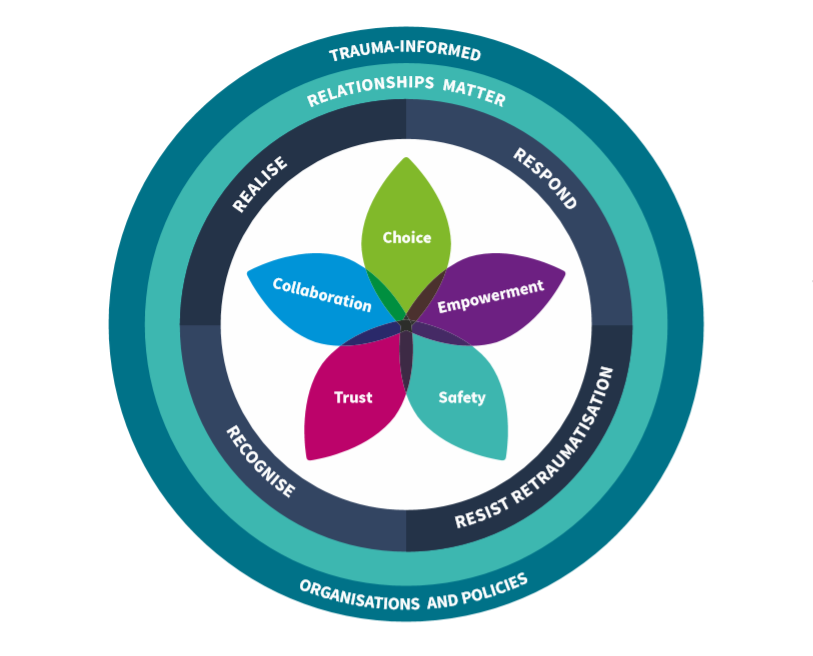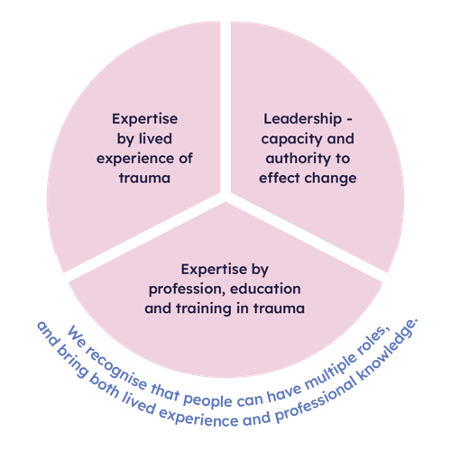NHS Education for Scotland logo

The National Trauma Transformation Programme (NTTP) is funded by the Scottish Government and delivered in partnership with COSLA, NHS Education for Scotland (NES), the Improvement Service (IS) and the Resilience Learning Partnership (RLP).
Scotland has paved the way in creating a vision of a trauma informed and responsive workforce and services that can recognise where people are affected by trauma and adversity, and that respond in ways that prevent further harm, support recovery, address inequalities and improve life chances. The National Trauma Transformation Programme (formerly known as the National Trauma Training Programme) is a major and long-term change programme, which aims to support this vision.

The NTTP provides a wide range of learning resources, guidance and implementation support for all sectors of the workforce, including leaders, to up-skill staff to the appropriate level of trauma-informed and responsive practice and, critically, to embed and sustain this model of working.
The Scottish Government is committed to preventing Adverse Childhood Experiences (ACEs) and trauma and supporting negatively affected children, young people and adults.
We are working in partnership with a wide range of sectors and services to help reduce the incidence and impact of all types of childhood adversity and trauma, focusing on:
We are also working to address the social and economic circumstances in which people live. Social inequalities, such as poverty or gender inequality, can influence levels of childhood adversity and trauma along with people’s ability to overcome such experiences.

Everyone in the workforce: everyone who works with people should be able to recognise how trauma and adversity affects the people and communities that they serve, and have the skills to respond in trauma informed ways – adapting how they teach, or advise, or medically examine, or take evidence in court, so that the impact of trauma does not create a barrier to learning, getting medical help, sustaining a tenancy, or seeking justice for offences like rape, and that the experience can be restorative and supportive of recovery.
Specialist clinicians: the NTTP also provides training for specialist clinicians so that those of us affected by trauma can access the specialist advocacy, support and interventions we need if and when we need it in order to recover.
Leaders: Leaders are essential to drive the organisational environment and culture necessary for trauma informed change, including attention to staff wellbeing and welfare and the implementation of skills in practice, partnerships that enable people with lived experience to drive change, and creating trauma informed physical environments, policies, and multi-agency approaches.
Evidence is growing that the experience of adversity and trauma within both childhood and adulthood is more common, and its impact across all areas of life more extensive, than we once thought.
Traumatic experiences affect most people at some stage in life, yet we often won’t know about people’s experiences and the impact of trauma is unique to each of us. By taking a trauma-informed approach we can use universal principles to help us to recognise the impact trauma may be having on the people we aim to work with and respond in a way that supports recovery whilst doing no further harm.
Implementing trauma-informed practice requires a collaboration between three groups that each bring a unique perspective and skillset, that is the Trauma-Informed Leaders, Experts by Experience, and Experts by Profession. These groups are not necessarily mutually exclusive, but continued collaboration across these areas facilitates the implementation of practices that are evidence-based, sustainable, and meaningful to people coming into contact with our services and organisations.

Visit our Networks and Support page to find out more about what support is available through the NTTP.
Visit our Leaders page to find out more about Scottish Trauma Informed Leaders Training (STILT)